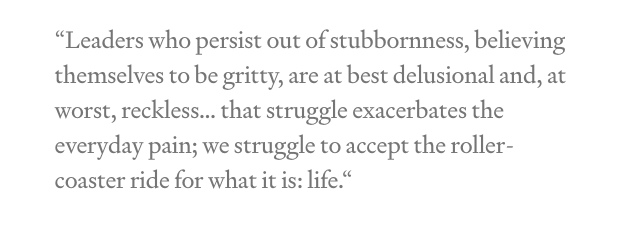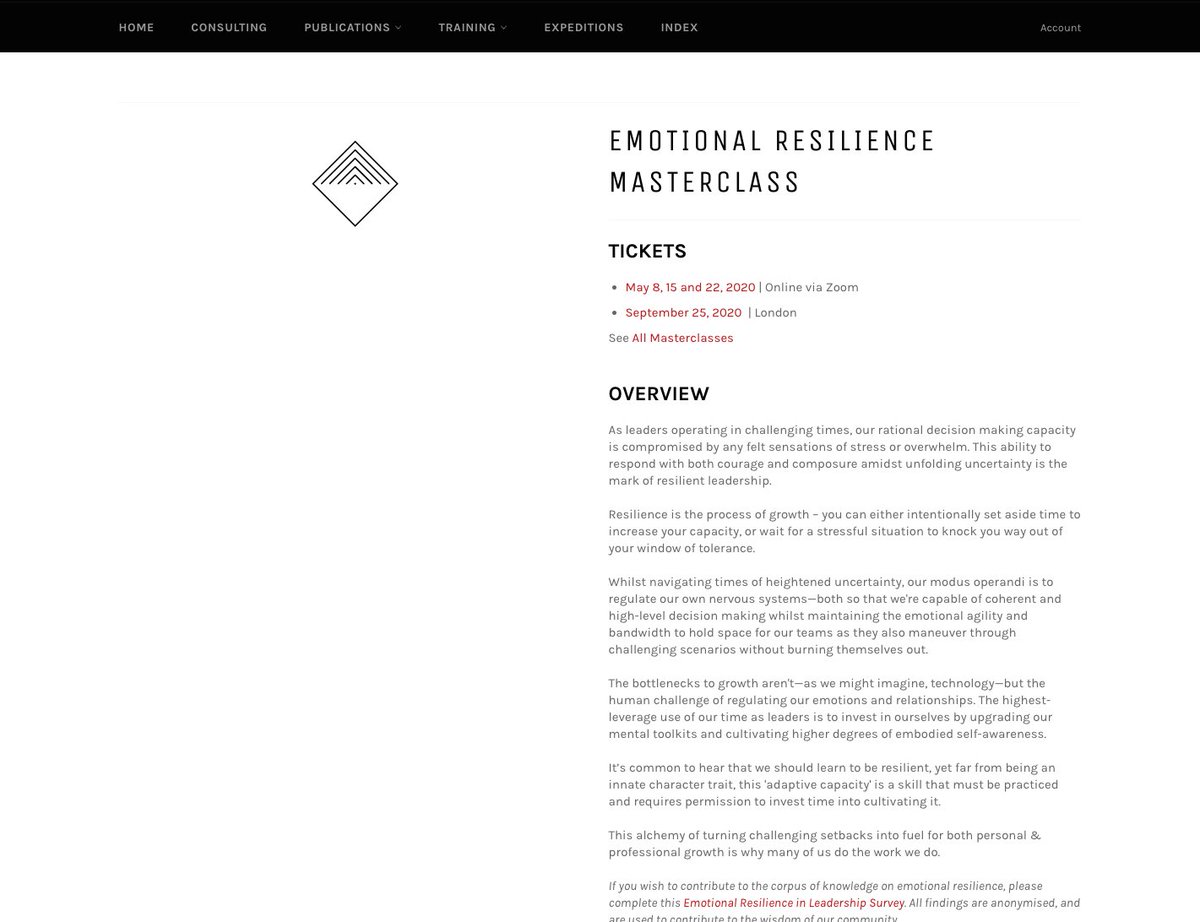I wrote an article with my personal story + thoughts on what it means to be a & #39;resilient& #39; leader—and the words feel even more relevant today in light of the emotional intensity + uncertainty generated by CV-19  https://abs.twimg.com/emoji/v2/... draggable="false" alt="😷" title="Face with medical mask" aria-label="Emoji: Face with medical mask">
https://abs.twimg.com/emoji/v2/... draggable="false" alt="😷" title="Face with medical mask" aria-label="Emoji: Face with medical mask">
See thread https://abs.twimg.com/emoji/v2/... draggable="false" alt="👇" title="Down pointing backhand index" aria-label="Emoji: Down pointing backhand index">
https://abs.twimg.com/emoji/v2/... draggable="false" alt="👇" title="Down pointing backhand index" aria-label="Emoji: Down pointing backhand index">
See thread
1 / It’s common to hear that we should learn to be resilient, yet far from being an innate character trait, resilience is a skill that must be practised — which requires permission to invest time & resources into cultivating it, which for most people is a financial constraint  https://abs.twimg.com/emoji/v2/... draggable="false" alt="💰" title="Money bag" aria-label="Emoji: Money bag">
https://abs.twimg.com/emoji/v2/... draggable="false" alt="💰" title="Money bag" aria-label="Emoji: Money bag">
2 / Instead, it’s all too common for those of us working in leadership positions to just to work longer hours until something gives way  https://abs.twimg.com/emoji/v2/... draggable="false" alt="😬" title="Grimacing face" aria-label="Emoji: Grimacing face">
https://abs.twimg.com/emoji/v2/... draggable="false" alt="😬" title="Grimacing face" aria-label="Emoji: Grimacing face">
With decades of experience working with founders and leaders as a former VC and coach, @jerrycolonna believes:
With decades of experience working with founders and leaders as a former VC and coach, @jerrycolonna believes:
3 / Whilst certainly not limited to the financial costs: founder and leader burnout severely impacts the bottom line of companies — yet it’s still not taken seriously at work.
4 / Although the media tends to demonise it, there is nothing inherently wrong with stress itself. Athletes create deliberate and intense stress to increase their performance. In fact absence of positive stressors — known as ‘eustress’ — stunts growth  https://abs.twimg.com/emoji/v2/... draggable="false" alt="🏋️♂️" title="Man lifting weights" aria-label="Emoji: Man lifting weights">
https://abs.twimg.com/emoji/v2/... draggable="false" alt="🏋️♂️" title="Man lifting weights" aria-label="Emoji: Man lifting weights">
5 / Given sufficient time for recovery and processing, these ‘stressful obstacles’ forge resilient leaders. It is the alchemy of turning challenging setbacks into fuel for both personal & professional growth and ultimately into wisdom. https://abs.twimg.com/emoji/v2/... draggable="false" alt="🧙♂️" title="Man mage" aria-label="Emoji: Man mage">
https://abs.twimg.com/emoji/v2/... draggable="false" alt="🧙♂️" title="Man mage" aria-label="Emoji: Man mage">
6 / In fact, being in a position of leadership is one of the most efficient vehicles of personal growth imaginable  https://abs.twimg.com/emoji/v2/... draggable="false" alt="🚀" title="Rocket" aria-label="Emoji: Rocket"> The level emotional intensity (eustress) will serve to surface your previously unexamined fears, insecurities and limiting beliefs.
https://abs.twimg.com/emoji/v2/... draggable="false" alt="🚀" title="Rocket" aria-label="Emoji: Rocket"> The level emotional intensity (eustress) will serve to surface your previously unexamined fears, insecurities and limiting beliefs.
7 / So the real question becomes, how do we train our resilience to stress as the path to growth?  https://abs.twimg.com/emoji/v2/... draggable="false" alt="💪" title="Flexed biceps" aria-label="Emoji: Flexed biceps">
https://abs.twimg.com/emoji/v2/... draggable="false" alt="💪" title="Flexed biceps" aria-label="Emoji: Flexed biceps">
8 / What I’ve learnt is that the path to resilience requires overcoming deep cultural conditioning — both in life + in the workplace—that equates vulnerability with weakness, that wears workaholism as a badge of honour and often suppresses any ‘negative’ emotions that surface.
9 / Resilience is a process *not* a final outcome, and one that relies upon cultivating embodied self-awareness — and for me this always begins with embracing curiosity  https://abs.twimg.com/emoji/v2/... draggable="false" alt="🔍" title="Left-pointing magnifying glass" aria-label="Emoji: Left-pointing magnifying glass">
https://abs.twimg.com/emoji/v2/... draggable="false" alt="🔍" title="Left-pointing magnifying glass" aria-label="Emoji: Left-pointing magnifying glass">
10 / Most of us were raised in a society that perceives vulnerability as weakness, that rewards us for being ‘self-reliant’ and never asking for help  https://abs.twimg.com/emoji/v2/... draggable="false" alt="🙋♂️" title="Happy man raising one hand" aria-label="Emoji: Happy man raising one hand">
https://abs.twimg.com/emoji/v2/... draggable="false" alt="🙋♂️" title="Happy man raising one hand" aria-label="Emoji: Happy man raising one hand">
We’ve been taught to live in our heads and being disconnected from our emotions and embodied feedback.
We’ve been taught to live in our heads and being disconnected from our emotions and embodied feedback.
11 / Our emotions are valuable feedback  https://abs.twimg.com/emoji/v2/... draggable="false" alt="🤔" title="Thinking face" aria-label="Emoji: Thinking face"> You might experiment by saying “What is my body trying to tell me with that tight stomach + clenched shoulders?” And then allow that experience to unfold, for most of us this takes time to learn and hone these resilience muscles.
https://abs.twimg.com/emoji/v2/... draggable="false" alt="🤔" title="Thinking face" aria-label="Emoji: Thinking face"> You might experiment by saying “What is my body trying to tell me with that tight stomach + clenched shoulders?” And then allow that experience to unfold, for most of us this takes time to learn and hone these resilience muscles.
12 / Like training for a marathon  https://abs.twimg.com/emoji/v2/... draggable="false" alt="🏃♂️" title="Man running" aria-label="Emoji: Man running"> when it comes to cultivating resilience — we are literally rewiring our nervous systems and mental conditioning — which is something that no-one can do for you, but solid guidance and support structures go a long way.
https://abs.twimg.com/emoji/v2/... draggable="false" alt="🏃♂️" title="Man running" aria-label="Emoji: Man running"> when it comes to cultivating resilience — we are literally rewiring our nervous systems and mental conditioning — which is something that no-one can do for you, but solid guidance and support structures go a long way.
If any of the above thoughts resonate, I& #39;d love to hear from you via DM. You can find more info below https://abs.twimg.com/emoji/v2/... draggable="false" alt="👇" title="Down pointing backhand index" aria-label="Emoji: Down pointing backhand index">
https://abs.twimg.com/emoji/v2/... draggable="false" alt="👇" title="Down pointing backhand index" aria-label="Emoji: Down pointing backhand index">
 https://abs.twimg.com/emoji/v2/... draggable="false" alt="📝" title="Memo" aria-label="Emoji: Memo"> Read the full essay on Medium: https://medium.com/@jonnym1ller/on-becoming-a-resilient-leader-fc6d9cce7a68
https://abs.twimg.com/emoji/v2/... draggable="false" alt="📝" title="Memo" aria-label="Emoji: Memo"> Read the full essay on Medium: https://medium.com/@jonnym1ller/on-becoming-a-resilient-leader-fc6d9cce7a68
https://medium.com/@jonnym1l... class="Emoji" style="height:16px;" src=" https://abs.twimg.com/emoji/v2/... draggable="false" alt="👨🎓" title="Man student" aria-label="Emoji: Man student">Check the schedule for my @studio_d_rad virtual resilience masterclasses in May: https://studiodradiodurans.com/products/emotional-resillience-masterclass">https://studiodradiodurans.com/products/...

 Read on Twitter
Read on Twitter With decades of experience working with founders and leaders as a former VC and coach, @jerrycolonna believes:" title="2 / Instead, it’s all too common for those of us working in leadership positions to just to work longer hours until something gives way https://abs.twimg.com/emoji/v2/... draggable="false" alt="😬" title="Grimacing face" aria-label="Emoji: Grimacing face"> With decades of experience working with founders and leaders as a former VC and coach, @jerrycolonna believes:" class="img-responsive" style="max-width:100%;"/>
With decades of experience working with founders and leaders as a former VC and coach, @jerrycolonna believes:" title="2 / Instead, it’s all too common for those of us working in leadership positions to just to work longer hours until something gives way https://abs.twimg.com/emoji/v2/... draggable="false" alt="😬" title="Grimacing face" aria-label="Emoji: Grimacing face"> With decades of experience working with founders and leaders as a former VC and coach, @jerrycolonna believes:" class="img-responsive" style="max-width:100%;"/>

 https://abs.twimg.com/emoji/v2/... draggable="false" alt="📝" title="Memo" aria-label="Emoji: Memo"> Read the full essay on Medium: https://medium.com/@jonnym1l... class="Emoji" style="height:16px;" src=" " title="If any of the above thoughts resonate, I& #39;d love to hear from you via DM. You can find more info belowhttps://abs.twimg.com/emoji/v2/... draggable="false" alt="👇" title="Down pointing backhand index" aria-label="Emoji: Down pointing backhand index">https://abs.twimg.com/emoji/v2/... draggable="false" alt="📝" title="Memo" aria-label="Emoji: Memo"> Read the full essay on Medium: https://medium.com/@jonnym1l... class="Emoji" style="height:16px;" src=" " class="img-responsive" style="max-width:100%;"/>
https://abs.twimg.com/emoji/v2/... draggable="false" alt="📝" title="Memo" aria-label="Emoji: Memo"> Read the full essay on Medium: https://medium.com/@jonnym1l... class="Emoji" style="height:16px;" src=" " title="If any of the above thoughts resonate, I& #39;d love to hear from you via DM. You can find more info belowhttps://abs.twimg.com/emoji/v2/... draggable="false" alt="👇" title="Down pointing backhand index" aria-label="Emoji: Down pointing backhand index">https://abs.twimg.com/emoji/v2/... draggable="false" alt="📝" title="Memo" aria-label="Emoji: Memo"> Read the full essay on Medium: https://medium.com/@jonnym1l... class="Emoji" style="height:16px;" src=" " class="img-responsive" style="max-width:100%;"/>


